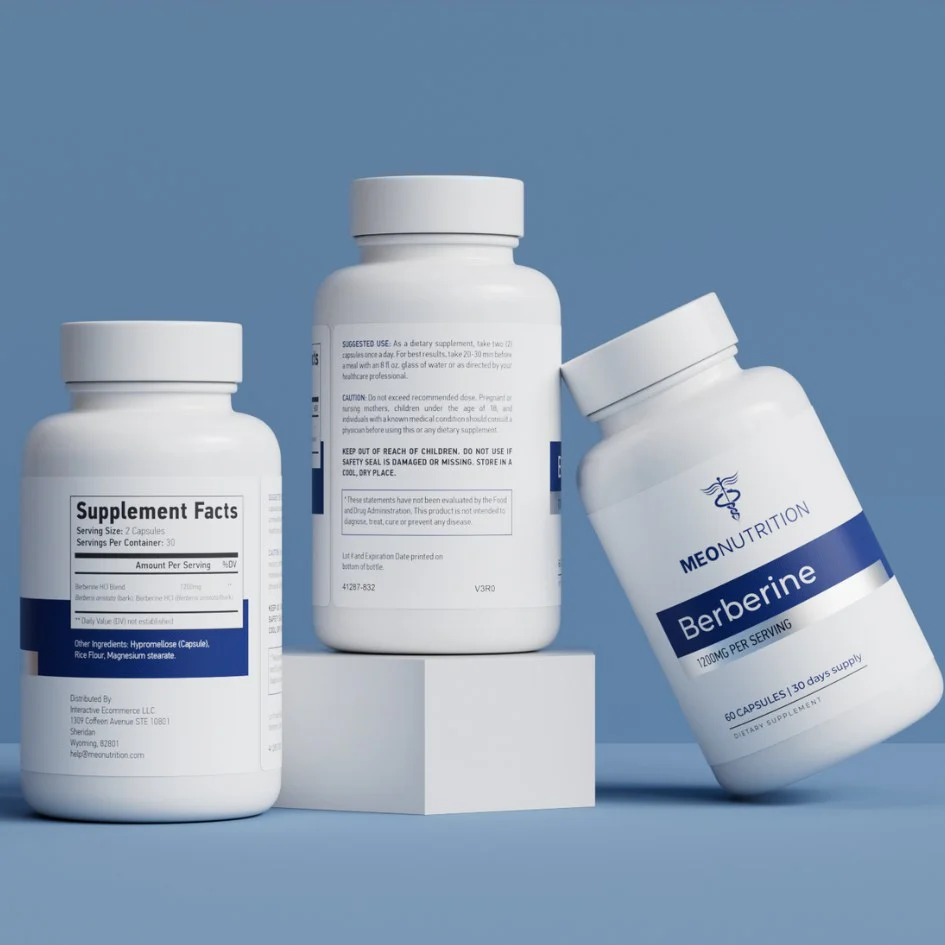When comparing Berberine vs Metformin, both are used to regulate blood sugar levels, but they differ in their source, function and safety considerations. Both offer benefits such as improving insulin response and potential cardiovascular protection.
Berberine is a natural compound derived from plants that has been traditionally used in herbal medicine to help support metabolism, enhance insulin sensitivity while promoting gut health.
Metformin is prescription medication, known by its effectiveness when it comes to managing type 2 diabetes. With a strong clinical evidence, FDA-approved with a well-established safety record, Metformin lowers blood sugar reducing diabetes-related risks.
Berberine is often taken as a general supplement for metabolic health, while metformin is strictly used for medical treatment.
When choosing between them, it will depend on your individual health goals and medical history! But its important to consult with a healthcare provider before incorporating Berberine into your routine, to make sure its suitable for your specific needs, allowing you to enhance and maximize its potential benefits!
What is Metformin?
Metformin, a commonly prescribed medication, is mainly used to treat type 2 diabetes as it helps to lower blood sugar levels improving how the body responds to insulin. How? By reducing glucose production in the liver which improves the body's ability to use insulin effectively.
Metformin is considered as a first-line treatment for diabetes due to its effectiveness, affordability and relatively low risk of serious side effects. Its also being studied for its potential benefits in metabolic health, among them weight management and reduced risk of cardiovascular disease. Emerging studies suggest that Metformin may play a role in bone health, as it has been linked to improve bone's density and lower risk of fractures in some individuals.

Some researchers have explored the concept of natural metformin, meaning finding a plant-based compound that mimics its effects, and Berberine is one such compound that has been studied for its ability to lower blood sugar, improve insulin sensitivity and support metabolic health.
What is Berberine?
Berberine is a natural compound that can be found in a variety of plants including berberis species like Goldenseal, Oregon Grape and Chinese Goldthread. It has been traditionally used in herbal medicine, known for its ability to support glucose metabolism, improve insulin sensitive and promote gut health.
As a plant-based alkaloid, Berberine has gained quite popularity over the last years for its great ability to support various aspects of health, especially metabolic function and heart health.

When comparing Berberine HC vs Berberine, the difference refers to the salt form of the compound. Berberine Hydrochloride is the most common and bioavailable form used in supplements offering the higher absorption and effectiveness compared to others forms. Its most commonly used to improve insulin sensitivity, blood sugar control, support heart health by reducing cholesterol and triglyceride levels.
Research shows Berberine has been proven to have a positive impact on sleep, as it helps to regulate blood sugar levels. For this reason it can directly improve quality sleep especially for people with diabetes or blood sugar imbalances.
Berberine is already recognized as a powerful supplement for promoting overall health, especially in managing metabolic health and supporting heart health.

Should I Take Berberine Instead of Metformin?
Whether to use Berberine instead of Metformin should be considered carefully. Berberine and Metformin are effective in managing blood sugar levels, but they differ in how they impact on the overall health.
Metformin, FDA-approved prescription medication is specially used on people who have type 2 diabetes. It helps to improve the insulin sensitivity and lower blood glucose levels.
Berberine, in the other hand, is a well known natural supplement derived from plants that has show promise in regulate blood sugar. It has also been shown to support joint health, reducing inflammation.
Both have shown potential benefits for brain health. It has anti-inflammatory and antioxidant properties which can potentially protect the brain from oxidative stress and inflammation, both of which are linked to cognitive decline. Metformin may have neuroprotective effects especially for people with type 2 diabetes, that could help reduce the risk of cognitive decline while improving brain function and health.
If you're thinking about switching from Metformin to Berberine, its key that you talk to your doctor about how the change might impact in your overall health. In this way, you will ensure that your approach is safe, effective and personalized your personal needs.
Can You Take Both Berberine And Metformin Together?
You can take Berberine and Metformin together, but its important to do it under the supervision of a healthcare professional to make sure its safe for you.
As we've stated before, both compounds are used to help control blood sugar levels, and together they may provide an even stronger effect! Especially for people who have type 2 diabetes. However, its important to have keep some things in mind.
Combining Berberine and Metformin may, in some cases, cause digestive issues like bloating, gas or diarrhea, so its important to monitor your digestive health.

When thinking about men's health, Metformin may have effects on testosterone levels, while Berberine may benefit overall metabolic health for example by supporting cholesterol levels.
So, taking Berberine and Metformin together is possible, but its essential to consult with a healthcare professional to ensure it is safe for your specific needs and to adjust doses if necessary. As a result, you will be able to maximize its benefits, avoiding unwanted side effects.
What Are The Side Effects of Metformin And Berberine?
Metformin and Berberine are used to manage blood sugar levels, but can cause side effects that vary from person to person.
Metformin's most common side effect are digestive issues that include nausea, bloating, gas, diarrhea and stomach discomfort. These effects can be reduced taking other medications with meals or lowering the dose. In rare cases, it might lead to lactic acidosis, a serious condition where there's a buildup of lactic acid in the blood. This is considered a medical emergency which can be life-threatening. Its important to know that people with kidney problems or liver disease should not take Metformin for this reason.
Berberine's side effects are mild but can include gastrointestinal issues such as constipation, stomach cramps, diarrhea. It may also cause a drop in blood sugar when combined with other diabetes medications. This can lead to hypoglycemia which can be dangerous.
As Berberine may also interact with other medications, its important to talk to a doctor if you are taking any! Especially if its for blood pressure, cholesterol and blood thinners.
People usually compare Berberine vs metformin for weight loss, and some research suggests Berberine may help to reducing body fat which supports weight management, by improving sensitivity. Metformin too, especially in individuals with insulin resistant, but weight loss with Metformin usually is slower compared to Berberine.

Conclusion
In conclusion, both compounds are a great option to regulate blood sugar levels, but in different ways: Metformin being a prescription medication with a long history of use for managing type 2 diabetes, while Berberine, a natural supplement known for its effectiveness on improving insulin sensitivity, supporting metabolic health and can positively impact cholesterol absorption.
Both also offer benefits like cardiovascular protection and potential improvements in brain health, but they may come with different risks and side effects in special cases.
When deciding between Metformin vs Berberine, your individual health needs, goals and medical history will be your compass. Consulting with a healthcare provider is very important to make sure you are choosing the right option, monitoring your health and any side effects. This will also help tailor a plan that best fits your health needs.
Always remember that all supplements and medications should be used with caution and under professional medical advice and supervision to ensure safety wile maximizing benefits.

